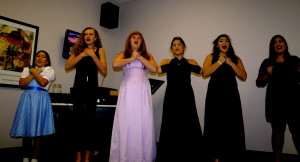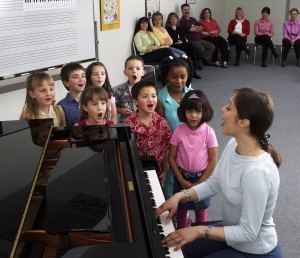Why Singing Is Good For You

Singing is one of the most common and natural ways to make music, and yet how many people sing regularly in a group? To my knowledge, it’s not many. Yet there are surprising benefits from singing that affect you mentally, emotionally and physically. So, yes, singing is good for you, in fact it’s a very economical way to stay healthy. Let’s see if I can give you enough reasons to have you singing by the end of my post. Ready?
Before I start discussing the benefits, I must address my own concern of what singing has become this day and age. When do you hear regular people singing in public? Possibly singing the “National Anthem” at school or professional game, or singing along with a band at a concert, or singing in church, or singing “Happy Birthday” at someone’s party. My experience is at the games, I’m usually the only one singing the anthem and the school song (if I know it), at a concert, the band plays so loud you can’t hear anyone’s voice, in church it all depends, sometimes I’m the only one singing, and sometimes I hear strong and weak voices scattered throughout the congregation, and of course everyone doesn’t hesitate to sing (usually quite badly) “Happy Birthday” acappella. I can’t help but think that most people do not like to sing or they don’t know how. I find that to be really sad. In college, we studied the feelings and attitudes children had toward singing and other musical activities. The PreK and Kinder aged kids enjoyed singing, and sometimes preferred singing over other musical activities, but as they got older the percentage fell dramatically and by middle school they would hate to sing. I often wondered how that could be.
Judging from the little singing we do in public, like the cases I mentioned before, it seems that singing, being a very personal activity to engage in in public, has become something only professionals do. Or society assumes that you have to have a certain voice or sound in order to sing regularly and in public. The radio and reality TV shows have reinforced this idea that if you don’t have “the voice” you should not sing. I’ve encountered so many people that swear they have a terrible voice and can’t sing and would be mortified if someone heard them. I’m determined to change those minds and help people realize that they can sing and should sing for their own good.
Singing is good for you, physiologically. Want a new healthy habit, instead of purchasing more vitamins, try singing. Those deep breaths necessary for singing long phrases and sustaining long notes and reaching high notes help expand your lung capacity. With each deep breath, more oxygen can fill the lungs and be absorbed by the body improving the levels of oxygen in the bloodstream. Singing is considered an aerobic exercise, which is good for muscles and the heart. Not only is singing good for your cardiovascular system, but it also prevents bacteria from settling in sinus cavities because it improves the air flow in the upper respiratory system which can help keep sinuses clear of infections. With all of those health benefits, it’s no wonder that singing will prolong your life. And yes, Yale and Harvard can back me up here, in a joint research study they found that singing prolonged life in a population in New Haven Connecticut. And it’s not just the health benefits alone that do the trick. According to an article in Time Magazine there are positive psychological effects as well. Singing also releases endorphins, the feel good chemical in your brain, as well as oxytocin, another chemical in your brain that lowers levels of stress and anxiety. Lowering stress can boost your immune system preventing illness. But just breaking into song alone may not bring you all of the benefits of singing.
Singing is good for you, psychologically and emotionally. Earlier I mentioned that singing releases endorphins and oxytocin. Well, singing in a group can enhance those effects even more. Nothing compares to hearing and feeling your voice blend with a group of voices singing beautiful harmony. Singing with others provides that sublime experience because there is an emotional connection people feel as they sing together. Whether it be the poignant lyrics or the moving harmonies the music embodies, there’s something about singing that releases tension and creates a strong connection with others. I find it hard to describe, but I’ve experienced this phenomenon time and time again with all sorts of groups of singers from little children in my music classes to elderly at a sing-along to a college choir full of trained singers. And the feeling never gets old. Sometimes, just singing a fun song with my husband brings me great joy. Singing is truly a divine gift that should not be wasted or ignored. Stacy Horn, the author of the Time Magazine article goes as far as to compare singing to therapy, and why not? Therapy is expensive and not something you can do for years and years if you don’t have that much extra money to spend, and singing can be free and a lifelong habit and possibly deliver the same results! Save your money and join a choir.

Singing is good for you, and the world. If you’re singing with others, you are making it possible for that singing group to exist, enabling others to also benefit from this transformational experience. If singing can help people deal with their feelings of sadness, anger, resentment, and frustration, then they will be better people because of it. And happier, healthier people are able to help others in the world. Think of the difference that could be made if everyone belonged to a singing group. Even if it’s not possible to get everyone in the world to sing, having more people singing would make a difference no matter what.
Getting back to those dismal results I mentioned earlier from my college class, you might be thinking the same thing I’ve been thinking: What’s the deal with kids not wanting to sing? Why don’t they like it? Well, I have a theory. Based on how rarely regular people sing in public and the sound of people singing “Happy Birthday”, I think it’s safe to assume that there are few parents that sing with their kids and feel qualified enough to teach their children to sing. If kids don’t experience the joy of singing at a young age, they miss out on the benefits and the advantages of knowing how to sing well and sing in tune. Learning to sing after the age of eight can be difficult and discouraging. In my music classes we do lots and lots of singing, and I can see on the kids faces that they love it. They are excited to learn the songs and enjoy how it sounds singing with their friends. I can tell that it makes them feel better. And the benefits are not limited to those that sing well and in tune, all people can experience the benefits no matter what their voice sounds like. Even in my beginning classes, the kids don’t sound very good yet, but they still enjoy it and we as a group still benefit from singing together. So, it’s not hopeless. Not all kids hate to sing. And there is still so much more that we can do to bring more singing into the lives of others.
Singing isn’t easy. The biggest reason why it’s incredibly beneficial is because the voice is the most personal of musical instruments. It’s your very own uniquely sounding voice, and sometimes sharing that with others makes you feel vulnerable. But that’s the very reason why singing has so many positive effects. It’s only when you feel vulnerable that you allow yourself to make connections with others, experience true joy and acceptance, and really get to know yourself and your voice.
So start singing! Join a local group, there are many at churches, maybe community centers, or start a group with your friends and family. If you have children, sing to them and with them, listen to music and feel free to sing along and of course take them to music class so they can receive vocal training and a chance to sing with a group of children.
And if you need more convincing,here’s another inspiring story on NPR to get you motivated.


Perfect i support it
Yeah i want to be a singer too i love singing